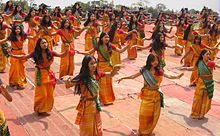Bathouism is the traditional religion of the Bodo people or Kachari people, named after Bathou which in Bodo means the five principles. The five principles are: bar (air), san (sun), ha (earth), or (fire) and okhrang (sky). The chief deity, called Bathoubwrai (bwarai: "the Elder")â€"omnipresent, omniscient and omnipotentâ€"is said to have created the five principles. Though there are other minor gods and goddesses, Bathoubwrai is considered the Supreme God. The second most important deity is Mainao, the consort of Bathoubwrai, who is considered as the "protector of the rice fields".
Sijou plant

The sijou plant signifies Bathoubwrai. Families that follow Bathouism plant a sijou shrub at the northeast corner of their courtyard, in an altar called sijousali. Bodo communities that follow Bathouism generally plant a sijou shrub at a community land, fenced with eighteen pairs of bamboo strips with five fastenings. Each pair symbolizes a pair of minor god-goddess. The five fastenings signify, from bottom: birth, pain, death, marriage and peace/pleasure. The bottom three fastenings, called bando, are those that one cannot escape in life; whereas the top two one could.
Gods, goddesses and gurus

(Endle 1911) differentiates between household gods and community gods. Of the household gods Bathoubwrai, Mainao, Song Raja/Bwrai and Bura Bagh Raja are considered prominent. The practice of representing Bathoubwrai by the sijou tree was more common in among the Mech of Goalpara region, and less so in Darrang. Song Raja is usually represented inside the house in an altar called dham, a deity who obtains devotion from women, and receives offerings during women's menses; but these offerings are eventually brought out and laid at the sijou tree representing Bathou. Traditionally Bura Bagh Raja represents the tiger, the king of the forests and the source of terror.
The eighteen pairs of gods-goddesses are: 1 Mwnsinsin bwrai-Mwnsinsin burwi, 2 Si Bwrai-Si Burwi, 3 Aham Bwrai-Aham Burwi, 4 Khuria Bwrai-Khuria Burwi, 5 Eheo Bwrai-Eheo Burwi 6 Mainao Bwrai-Mainao-Burwi, 7 Bwlli Bwrai-Bwlli Burwi, 8 Deva Bwrai-Devi Burwi, 9 Gongar Bwrai-Gongar Burwi, 10 Joumwn Bwrai-Joumwn Burwi, 11 Song Raja-Song Rani, 12 Hasung Bwrai-Hasung Burwi, 13 Rajong Bwrai-Rajong burwi, 14 Agrang Bwrai-Agrang Burwi, 15 Hazw Bwrai-Hazw Burwi, 16. Emao Bwrai-Emao Burwi 17. Mohela Bwrai-Mohela Burwi and 18. Hafao Bwrai-Hafao Burwi.
Worship

Traditional
Traditional Bathouism does not have any written scripture or religious book, nor temples. The worship is performed at the sijousali, and constituted offering animals and fowls for sacrifice and rice beer. Notable religious festivals were Kherai, Garja and others. These ceremonies are performed by priests called Douri (male priest) and Doudini (female priest). This religion was not organized.
Revivalism/Reformation
All Bathou Religious Union, an organization, was constituted in 1992; and it has begun reviving and reforming the traditional religion. The traditional role of the Douri and Doudini are replaced by the Gwthari Asari appointed by the organization, and a band of singers who sing in a practice called Bathou Aroj. The construction of temples, resembling churches or mosques called Thansali, have come into being. Bathou aroj is performed on Tuesdays in Thansalis. Sacrifices of animals and fowls, and offering of rice beer as modes of worship has been replaced by offering of flowers, fruits and the burning of incense. The partaking of prasad has become popular.
Notes

